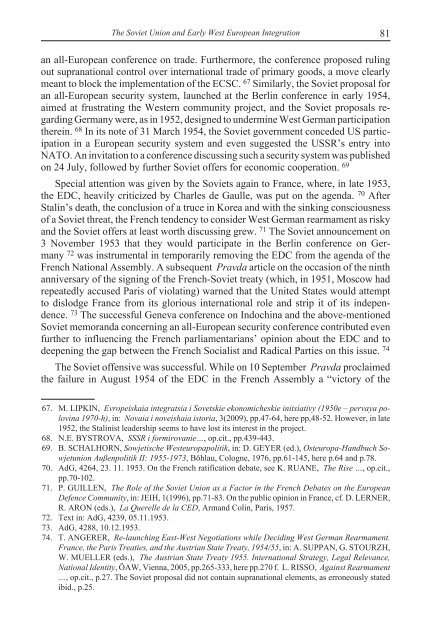Journal of European Integration History - Centre d'études et de ...
Journal of European Integration History - Centre d'études et de ...
Journal of European Integration History - Centre d'études et de ...
Create successful ePaper yourself
Turn your PDF publications into a flip-book with our unique Google optimized e-Paper software.
The Sovi<strong>et</strong> Union and Early West <strong>European</strong> <strong>Integration</strong> 81<br />
an all-<strong>European</strong> conference on tra<strong>de</strong>. Furthermore, the conference proposed ruling<br />
out supranational control over international tra<strong>de</strong> <strong>of</strong> primary goods, a move clearly<br />
meant to block the implementation <strong>of</strong> the ECSC. 67 Similarly, the Sovi<strong>et</strong> proposal for<br />
an all-<strong>European</strong> security system, launched at the Berlin conference in early 1954,<br />
aimed at frustrating the Western community project, and the Sovi<strong>et</strong> proposals regarding<br />
Germany were, as in 1952, <strong>de</strong>signed to un<strong>de</strong>rmine West German participation<br />
therein. 68 In its note <strong>of</strong> 31 March 1954, the Sovi<strong>et</strong> government conce<strong>de</strong>d US participation<br />
in a <strong>European</strong> security system and even suggested the USSR’s entry into<br />
NATO. An invitation to a conference discussing such a security system was published<br />
on 24 July, followed by further Sovi<strong>et</strong> <strong>of</strong>fers for economic cooperation. 69<br />
Special attention was given by the Sovi<strong>et</strong>s again to France, where, in late 1953,<br />
the EDC, heavily criticized by Charles <strong>de</strong> Gaulle, was put on the agenda. 70 After<br />
Stalin’s <strong>de</strong>ath, the conclusion <strong>of</strong> a truce in Korea and with the sinking consciousness<br />
<strong>of</strong> a Sovi<strong>et</strong> threat, the French ten<strong>de</strong>ncy to consi<strong>de</strong>r West German rearmament as risky<br />
and the Sovi<strong>et</strong> <strong>of</strong>fers at least worth discussing grew. 71 The Sovi<strong>et</strong> announcement on<br />
3 November 1953 that they would participate in the Berlin conference on Germany<br />
72 was instrumental in temporarily removing the EDC from the agenda <strong>of</strong> the<br />
French National Assembly. A subsequent Pravda article on the occasion <strong>of</strong> the ninth<br />
anniversary <strong>of</strong> the signing <strong>of</strong> the French-Sovi<strong>et</strong> treaty (which, in 1951, Moscow had<br />
repeatedly accused Paris <strong>of</strong> violating) warned that the United States would attempt<br />
to dislodge France from its glorious international role and strip it <strong>of</strong> its in<strong>de</strong>pen<strong>de</strong>nce.<br />
73 The successful Geneva conference on Indochina and the above-mentioned<br />
Sovi<strong>et</strong> memoranda concerning an all-<strong>European</strong> security conference contributed even<br />
further to influencing the French parliamentarians’ opinion about the EDC and to<br />
<strong>de</strong>epening the gap b<strong>et</strong>ween the French Socialist and Radical Parties on this issue. 74<br />
The Sovi<strong>et</strong> <strong>of</strong>fensive was successful. While on 10 September Pravda proclaimed<br />
the failure in August 1954 <strong>of</strong> the EDC in the French Assembly a “victory <strong>of</strong> the<br />
67. M. LIPKIN, Evropeiskaia integratsia i Sov<strong>et</strong>skie ekonomicheskie initsiativy (1950e – pervaya polovina<br />
1970-h), in: Novaia i noveishaia istoria, 3(2009), pp.47-64, here pp,48-52. However, in late<br />
1952, the Stalinist lea<strong>de</strong>rship seems to have lost its interest in the project.<br />
68. N.E. BYSTROVA, SSSR i formirovanie…, op.cit., pp.439-443.<br />
69. B. SCHALHORN, Sowj<strong>et</strong>ische Westeuropapolitik, in: D. GEYER (ed.), Osteuropa-Handbuch Sowj<strong>et</strong>union<br />
Außenpolitik II: 1955-1973, Böhlau, Cologne, 1976, pp.61-145, here p.64 and p.78.<br />
70. AdG, 4264, 23. 11. 1953. On the French ratification <strong>de</strong>bate, see K. RUANE, The Rise …, op.cit.,<br />
pp.70-102.<br />
71. P. GUILLEN, The Role <strong>of</strong> the Sovi<strong>et</strong> Union as a Factor in the French Debates on the <strong>European</strong><br />
Defence Community, in: JEIH, 1(1996), pp.71-83. On the public opinion in France, cf. D. LERNER,<br />
R. ARON (eds.), La Querelle <strong>de</strong> la CED, Armand Colin, Paris, 1957.<br />
72. Text in: AdG, 4239, 05.11.1953.<br />
73. AdG, 4288, 10.12.1953.<br />
74. T. ANGERER, Re-launching East-West Negotiations while Deciding West German Rearmament.<br />
France, the Paris Treaties, and the Austrian State Treaty, 1954/55, in: A. SUPPAN, G. STOURZH,<br />
W. MUELLER (eds.), The Austrian State Treaty 1955. International Strategy, Legal Relevance,<br />
National I<strong>de</strong>ntity, ÖAW, Vienna, 2005, pp.265-333, here pp.270 f. L. RISSO, Against Rearmament<br />
…, op.cit., p.27. The Sovi<strong>et</strong> proposal did not contain supranational elements, as erroneously stated<br />
ibid., p.25.

















